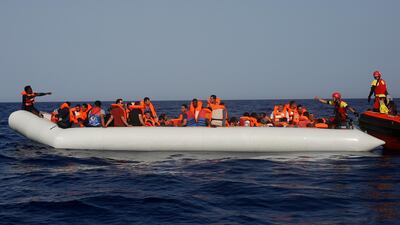On Friday, 70 people lost their lives when their boat capsized in the Mediterranean sea. Tunisian rescue boats only managed to save 16 passengers. It was the deadliest single event to affect the thousands of migrants who make the perilous journey from war-torn Libya to Europe every year. Like many before them, the vessel's passengers, who were from a variety of African and Asian nations, hoped only for a better life.
According to recent reports, the number of migrants entering Europe by sea has declined by 30 per cent in 2019, and the number of deaths at sea has fallen from 620 to 443. That is still 443 too many. After the fall of Muammar Qaddafi in 2011, Libya's porous borders and huge coastline attracted many people hoping to make the crossing to Europe. However, their journeys have always been fraught with danger, from the violence of the nation's civil war to the smugglers who promise to take them to Europe for extortionate fees, aboard overcrowded and poorly maintained boats. Many do not even make it that far, ending up in squalid migrant detention centres and falling victim to what Amnesty International describes as "appalling abuse and torture".
At a time when Libya is being torn apart by conflict, nations on the other side of the Mediterranean are mired in populism, nativism and protectionism. Instead of coming to the aid of those who are fleeing violence and poverty, anti-immigrant politicians have stoked resentment against them and clamped down on rescue missions. This is especially true of Italy, the sunken boat's destination. Since he rose to power in 2018, the nation's deputy prime minister Matteo Salvini has repeatedly declared Italian waters closed to NGO rescue ships. He has even left such vessels and the migrants they have saved stranded at sea.
More broadly, European border policy has failed to address adequately the pressing matter of Mediterranean migration. From 2013 to 2014, Mare Nostrum – a naval and air operation carried out by the Italian government and funded by the EU – focused on rescue missions, saving 150,000 people. However, it was soon replaced by operations with a focus on deterring migration and enforcing security. Part of the problem is that a handful of countries, such as Greece and Italy, have been forced by EU law to take in the vast majority of migrants who make the journey to Europe by sea. This is a result of the so-called Dublin regulation, which stipulates that those seeking asylum are the responsibility of the first member state they enter. The system is clearly failing. Increased co-operation across the Mediterranean and a better division of responsibilities between EU states is vital to prevent more tragedies. Migrants are human beings and preserving their lives must always be the greatest priority.

